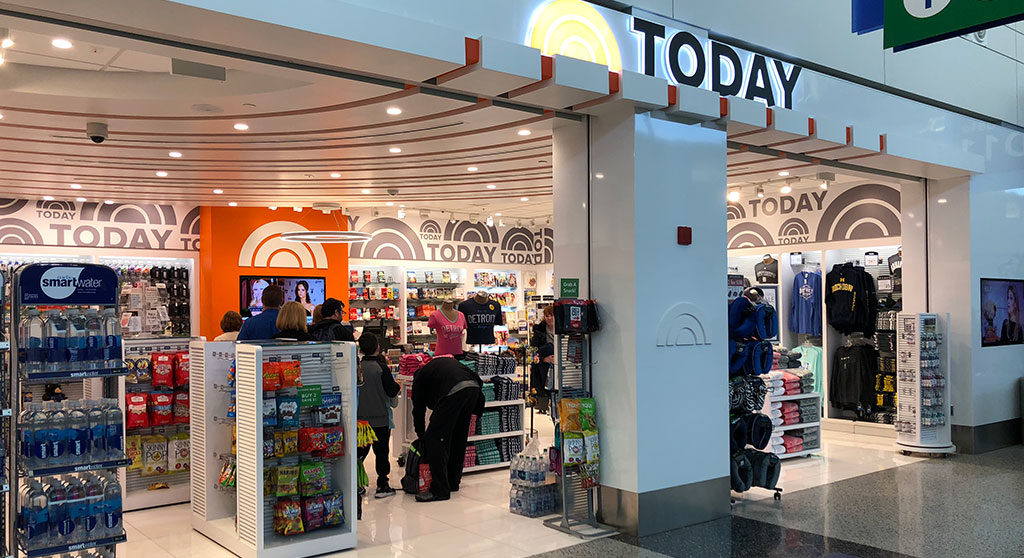What Can the “Today” Show Brand Gain From Selling Yogurt and Aspirin in the Detroit Airport? Not a Lot.

Before I started my career in marketing, I would begin my day reading newspapers and watching “Today,” the morning news program on NBC. Obviously dating myself, this was during the years it was hosted by Jane Pauley and Bryant Gumbel.
While my schedule and my news-gathering habits have changed quite a bit since then, I still have a fairly good grasp of what the “Today” brand stands for, or, as we say in the marketing business, its brand equity – how it is perceived by consumers. It continues to be among the top-rated morning network television programs for millions of Americans looking to catch up on current events and entertainment as they get ready to start their day.
So, it was with some surprise, stopping for a bottle of water and a magazine in the Detroit Metropolitan Wayne County Airport (DTW) while on a recent trip, that I looked up and realized I was making this purchase in a “Today” show store, labeled unambiguously with the iconic sunrise logo. While I know there is intense competition among the increasing number of media brands, each one trying to get their name and content in front of as many viewers and users as possible, was a generic convenience store in an airport really a good branding initiative for the TODAY show? Categorically speaking, as a brand extension, did it make any sense? What could either entity possibly gain from the venture? From my marketer’s point of view, not a lot. Here’s why.
A simple rule of thumb when considering a brand extension is that this action must do two things. It has to help you compete and gain an advantage in the new category, and it has to reflect positively on the parent brand, adding to its existing equity. You have to feel certain it will help sell new products and reinforce existing products. The relationship between the two has to be symbiotic, a win-win.
How do you ensure it’s a win-win? Two words; fit and leverage. To be successful, a brand extension must fit what consumers will accept – or expect – -from this new brand based on how they think about the parent brand. Think about it as the degree of stretch-ability without losing credibility. Leverage is based on the distinctive properties a brand owns that will provide the necessary competitive advantage in the new category. Leverage gets consumers in the new category to perceive the brand extension as superior to its competitors as a result of their feelings about the parent brand.
Good examples? Arm & Hammer leveraged its brand equity from the cleaning and deodorizing attributes of its core product, baking soda, into oral hygiene and laundry care. The fit made sense and it leveraged the brand name in a way beneficial to all product lines, old and new. Another example is the way National Geographic leveraged its brand equity as an extoller of the glories of the natural world in magazines and documentary films to launch a cruise business which enables people to experience these glories first-hand. Again, it’s befitting to how people think about the brand, in general, and all its branded products gain advantage as a result.
So, the “Today” show and the “Today” show store. As I said earlier, the NBC program is a venerable and long-standing mass media purveyor of news and information, with a fair share of entertainment hype thrown in to keep people tuned in beyond the daily headlines. Its brand equity is based on the quality of its content and the personality of the anchors it employs to share this content. From my perspective, the “Today” show brand name offers no competitive leverage in the generic convenience store category other than the fact that it sells magazines and newspapers. It’s neither a convincing or beneficial fit. Equally so, the store does nothing to give the “Today” show any advantage in the battle for morning news ratings. In fact, I think the “Today” show brand name is diluted by attaching itself to the convenience store category.
Brand extension is a marketing strategy in which an organization uses its well-developed image to launch another product in a different business category. Successfully done, it increases consumer interest in, and willingness to try, the new product based on the established brand’s name. The right way to take on a brand extension is to ensure that what you are doing reinforces what the parent brand stands for in peoples’ minds, and leverage this to create an advantage in the new category. The wrong way is to weaken the brand name by stretching it too far from this meaning. Your action has to help you compete in the new sector and, at the same time, pay back equity to the parent brand. As I said earlier, win-win. With all due respect to the “Today” show, walking through the Detroit International Airport looking for a bottle of water and a magazine, I would not have changed my purchase behavior had the store been called Mel’s variety. And, had I still had the time to watch morning news shows, seeing the “Today” show store would not have convinced me to switch allegiance from “Good Morning America” or “CBS This Morning.” Sorry to say, but in my marketing book of rules, this situation is a lose-lose.
Bring the best of the CEOWORLD magazine's global journalism to audiences in the United States and around the world. - Add CEOWORLD magazine to your Google News feed.
Follow CEOWORLD magazine headlines on: Google News, LinkedIn, Twitter, and Facebook.
Copyright 2025 The CEOWORLD magazine. All rights reserved. This material (and any extract from it) must not be copied, redistributed or placed on any website, without CEOWORLD magazine' prior written consent. For media queries, please contact: info@ceoworld.biz








